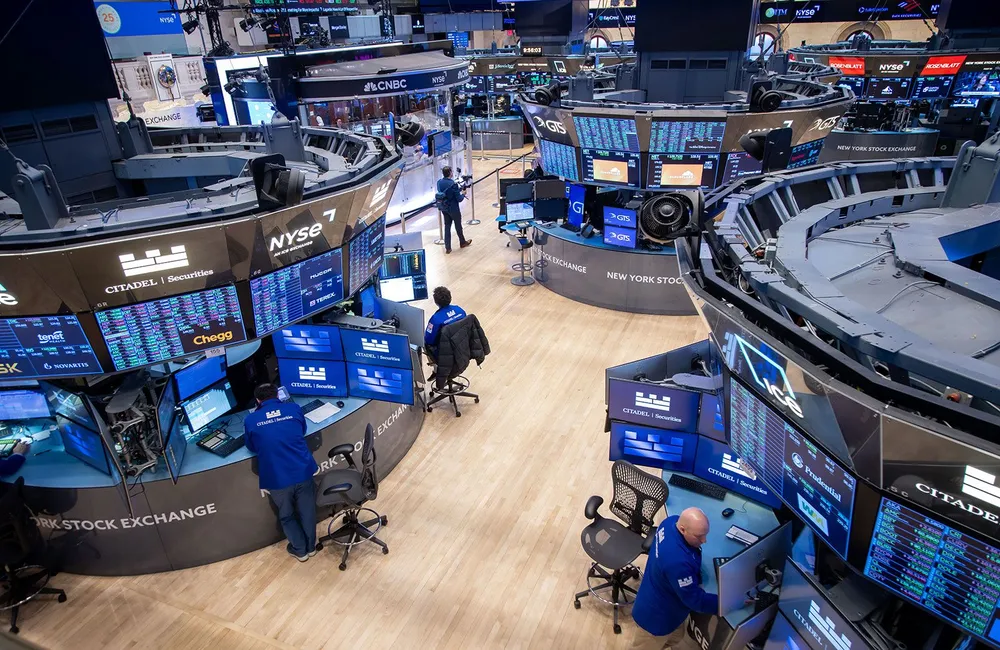Woodside combines with BHP to create a petroleum brand before ditching the petroleum
Woodside Energy: After 98.67% of shareholders waved the flag for the long-awaited merger with BHP Petroleum, Woodside Petroleum’s new name is Woodside Energy. Shortly afterward, some investors voted down the company’s climate report, with just less than half of them indicating they expect more than a rebrand from a company that is on the hook to invest $16.5 billion drilling more natural gas. That report committed Woodside to a 30% reduction in emissions from production and electricity use by 2030.
Brambles shambles
Monday 8.24 am:Brambles reveals “preliminary engagement” with European private equity colossus CVC Capital Partners. Shares soar 11% on speculation the deal will be worth approximately $20 billion (approximately $13.9 a share, a 33% premium to the pre-offer price).
Tuesday 9.26 am: The deal is dead. The deal was scuppered by CVC because of “external market volatility”, a brief announcement at the ASX said.
Unemployment numbers are dy-no-mite!
We haven’t seen unemployment numbers like this since the 1970s. Issuing figures on Thursday just in time for Saturday’s election, the ABS reported unemployment had dipped to 3.9% in April, a 48-year low. A day prior, wage growth took a downside surprise, registering an annual increase of 2.4% for the March quarter. Many were preparing for a sharper number after the Reserve Bank partly explained this month’s shock 0.25% rate rise by citing to talks with businesses, where “higher wage increases are now taking place”. Future bets on where interest rates will land by December loosened a touch, falling to 2.6%.
Target lands wide of the mark
US markets puked on Wednesday when Target and Walmart gave investors the kind of earnings they run from. The benchmark S&P 500 dropped 4 percent, its worst rout in nearly two years. Decliners were led by Target, which was down 25%. Walmart fell 17% over Tuesday and Wednesday. The retailers are grappling with how to pass on higher prices to consumers who are increasingly spooked by falling real wages and rising energy prices. And the worst part, unsold inventories are exploding at Target: People finally have enough new TVs and toasters.
Or how otherwise Elon Musk seeks a one-up.
Elon Musk, the founder of Tesla and Twitter troll, is back at it.
He wrote on Twitter last Friday that his takeover bid for the social media site was “on hold” while he assessed spam accounts. Too late, argues the legal profession. And since we waived due diligence and signed the merger deal, the show must go on. Some view it as a gambit intended to put Twitter’s board in a bind: Offer a humiliating discount or pursue Musk, along with an army of lawyers, through the courts to force him to go through with the deal. An accelerating selloff of technology stocks since the deal was struck in late April is making Musk’s $54.20 a share offer look expensive. Tesla, the underlying company which Musk will be forced to liquidate large portions of over the deal, has cratered almost 30% since he bent down to sign.
It's not enough to be green
Musk is also hitting the headlines this week for another reason, Tesla was dropped from the ESG-version of S&P 500 index indices on Thursday. Cue Twitter storm. Musk was particularly annoyed that oil & gas giant ExxonMobil was on the list. Tesla doesn’t just make electric cars, he was quick to point out. S&P later defended its decision, mentioning accusations of racial discrimination and unsafe working conditions at Tesla’s California factory and the way it has handled a government inquiry into accidents involving vehicles with an autopilot feature. Less E, more S and G.
Iron ore shakes as China promises lockdowns
When China sneezes, iron ore catches a cold, and the world’s most populous country is coming down with the flu. The world’s largest commodity importer saw economic growth slow in April, as stringent lockdowns kept tens of millions indoors and closed factories, according to data released this week. Iron ore has fallen 15% in a month, unwinding a steady price runup that insulated local equities from the worst of the global selloff. Traders are also reconsidering a potential slowdown in the steel-hungry construction sector. China watchers await to see whether officials pull the old infrastructure spending playbook off the shelf to ginger up the slowing economy. The last round stimulus in 2008 inflated the Australian mining boom but Chinese leaders have made their shift away from debt-fuelled infrastructure binges clear. Will they stay the course?
Market wrap: ASX scores a win as financial zeal wanes
The Australian share market has surged to end a four-week losing run, with near universal gains across sectors following efforts by China to boost its economy.
The benchmark S&P/ASX200 index closed on Friday higher 81.1 points at 7,145.6, a 1.15% increase; the broader All Ordinaries up 87.7 points, or 1.2%, at 7,391
For the week the ASX200 increased 1.0%, its best performance since the week ended Friday, April 1.
“It’s a nice way to end the week, everything’s a little better. “And so, long may it last, as they say,” said Chris Weston, a market analyst at Pepperstone.
But he said he was cautious of the rally. "I don't trust it at all. I’ll take it, but I don’t trust it. Sell rallies is definitely the mantra right now. The market was trying to find levels where you sell strength rather than buy weakness.’
China's central bank on Friday cut rates on a key lending benchmark in a bid to revive its lockdown-battered economy, which may have triggered the rally, Mr Weston said.
Tech stocks were the leading beneficiaries on Friday, with the sector climbing 4.6% to end a six-week losing streak with a 5.0% weekly gain.
MyDeal.com.au jumped 55.8% to $1.005 after Woolworths bailed out shareholders, agreeing to buy the online marketplace for $1.05 a share, or an outlay of $243 million.
The energy sector had dropped after Woodside shareholders on Thursday approved a merger worth $41 billion with BHP’s petroleum business, which will see 914 million new Woodside shares issued to BHP shareholders.




















